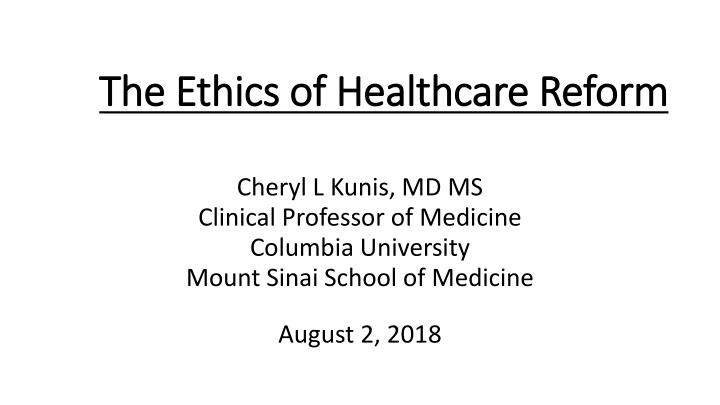
Ethics of Healthcare Reform and US Healthcare Spending
"Explore the ethical considerations of healthcare reform and the challenges faced by the US healthcare system, including high costs, disparities in access, and the need for universal coverage. Learn about the impact of prices, regulatory issues, and goals for reform to improve healthcare quality and equity."
Download Presentation

Please find below an Image/Link to download the presentation.
The content on the website is provided AS IS for your information and personal use only. It may not be sold, licensed, or shared on other websites without obtaining consent from the author. If you encounter any issues during the download, it is possible that the publisher has removed the file from their server.
You are allowed to download the files provided on this website for personal or commercial use, subject to the condition that they are used lawfully. All files are the property of their respective owners.
The content on the website is provided AS IS for your information and personal use only. It may not be sold, licensed, or shared on other websites without obtaining consent from the author.
E N D
Presentation Transcript
The Ethics of Healthcare Reform The Ethics of Healthcare Reform Cheryl L Kunis, MD MS Clinical Professor of Medicine Columbia University Mount Sinai School of Medicine August 2, 2018
Health Care Reform in the US Health Care Reform in the US Science & technology are advancing rapidly Population continues to expand Aging population requires more health care Cost of health care continues to rise Medicine is no longer an art or a profession, it is a business Several different payment models in the US The US has millions of uninsured people There are racial & socioeconomic differences in access to health care & health outcomes in the US All industrialized nations except the US have universal health care Health Care Reform needed We must strive for high quality, equitable & cost efficient health care
Healthcare Spending in the USA (Papanicolas , et al. JAMA 2018) (Data 2013-2016) The US spent 17.8% of its GDP on healthcare (9.6-12.4% in 10 other high income countries) in 2016 Lowest life expectancy (78.8 years vs 80.7-83.9) Highest infant mortality Highest incidence of obesity (or overweight) (70.1%) Highest utilization of CT & MRI Scanners Highest administrative costs (8% vs 3% of GDP) Highest pharmaceutical costs (& devices) Similar usage of healthcare (including social spending) Highest salaries for MD s and nurses (fee for service system) Higher hospitalization costs Conclusion: US spends twice as much on healthcare as other high income countries with similar utilization of health care services but poorer outcomes
Health Care Spending in the USA (Papanicolas, et al. JAMA 2018) Impetus for healthcare reform Where should policy makers target their efforts? PRICES in the US are the major driving forces for the difference in overall healthcare costs No regulation on pricing 10% of US population does not have access to basic healthcare services (improvement with the ACA) US public reports the lowest satisfaction with their healthcare system (only 19% believe the system works well) Greatest inequity in receiving healthcare when adjusted for need Shorter life expectancy among nonwhite & poorer US populations Population health outcomes vary within the US Goal 1: Reduce prices & administrative costs Goal 2: Broaden Insurance coverage Goal 3: Distributive Justice: high quality healthcare for all is a step forward in fighting racism & poverty in the US
HEALTH CARE IS A MORAL ISSUE HEALTH CARE IS A MORAL ISSUE
The Moral Perspectives on Health Care The Moral Perspectives on Health Care Health Care is a Human Right Health Care is a Positive Public Health Measure (the social ethic) Health Care and the Business Ethic
Health Care is a Human Right As a nation, we believe that individuals have a right to health care Obligation to ensure that poverty does not interfere with access to health care Health care is morally different from other goods & services Poor health would prevent an individual from participating in society Society s commitment to egalitarianism Justice requires equal opportunity Belief that life is sacred (beyond value) Thus, health care should be MORALLY guaranteed The American health care system is not MORALLY responsible If all of the above is true, we need health care reform to provide equitable high quality universal coverage
Health Care as a Public Health Measure Health as a social good Society benefits from a healthy workforce Health care conforms to the social ethic How much health care is in the best interests of society? Resources are limited Society needs to support other valuable goods & services
Health Care & the Ethics of Business Medical care has never been a completely charitable endeavor Hospitals used to be charitable institutions Hospitals are now business institutions The health care industry responded to market forces (advancing technology, employer- sponsored health insurance, Medicare, & Medicaid) because they could now get paid for services that used to be charity care Everyone got on the band wagon as the business became ever more successful Is the health care industry morally corrupt? If health care is a human right, the business ethic may be harmful & therefore unethical They are behaving by the ethics of business Reimbursement for health care was removed from the individual (insurance company or government paid for the medical service) so there was no incentive to economize The costs will continue to rise to whatever the market will bear until the system implodes or we find a way to reverse the trend
Conflicts within the 3 Moral Perspectives If health care is a moral right, then individuals should have the right to every type of care, regardless of potential outcomes & recommendations (the Lakeberg twins) Because resources are limited, this technologic imperative would devastate the economy and draw needed funds away from other important services, such as education, infrastructure, & law enforcement If the business model took priority, the poor & uninsured would suffer Health as a public health measure would work for the social good, so it would limit individual choice which would be considered a form of rationing We need to reform our health care system, but it is clear that each moral perspective has its undesirable consequences How can we balance these 3 disparate moral perspectives? We need a health care payment model that is just & cost efficient
The Health Insurance System The craftsmen guilds in Prussia that formed the first health insurance systems in the Middle Ages were based upon the Principle of Solidarity: all members paid into a fund that helped those with financial hardships, e.g. due to illness Insurance funds for factory workers existed in the early industrial revolution 1883 The German government passed a law requiring all workers to have health insurance (modern insurance plan) Both employer & employee contributed to sickness funds Free medical care, medication, sickness benefits and a funeral allowance 1884: Accident insurance 1889: Pension funds
Otto Von Bismarck Otto Von Bismarck The Iron Chancellor The Iron Chancellor (1815-1898) 1883 HEALTH INSURANCE LAW Healthy workers will improve the economy
The 1883 Health Insurance Law (Bismarck) Although Bismarck was a conservative & militaristic chancellor, this law created a welfare state by instituting mandatory, universal government- monitored health insurance for workers Bismarck enforced this law to get workers to support his political agenda This was the 1st national health care system in the world The first modern form of health insurance It was a great success, improved worker s health & diminished German emigration It was enforced in other European countries under Nazi occupation during WW ll
The US Health Care System Several insurance plans formed in the 1800 s in the US (Civil War) First modern day insurance plan (employer-sponsored) formed in 1929 in Texas Non-profit Blue Cross & Blue Shield was then formed FDR decided NOT to pass Universal Healthcare with the SS Act of 1933 Many Insurance Companies formed after World War ll Employer-sponsored profit driven health insurance became the norm The private health insurance industry is huge, engrained in the American system Extraordinarily high administrative costs Medicare and Medicaid passed 1965 (government run nonprofit system) Millions of Americans lack health insurance Medical expenses are the #1 cause of bankruptcy in the US All other industrialized nations followed the Bismarck form of social insurance or a national government run health service (UK, NZ, Cuba)
Uwe Reinhardt (1937-2017) It s the Prices, Stupid If we had to do it over again, no policy analyst would recommend the US model It is a chaotic market that operates behind a veil of secrecy Cutting the cost of administration in would insure everyone I believe the German system is still the best model there is A private health care delivery system with universal coverage and social solidarity It s inexpensive and equitable. Coverage is portable. You re never uninsured in Germany No family goes broke over health care bills Universal coverage is not a matter of economics .it is a matter of soul
Health Care Payment Models Social Insurance (Bismarck Model) (Germany & most of Europe) National Health Service (Beveridge Model) (UK, NZ) Single Payer System (combines elements of Beveridge & Bismarck models) (Canada) Out of Pocket Model (poor countries & the US) Universal Voucher System (provides basic health care for all & vouchers for advanced care) The US health care system is an inefficient conglomerate of public single payer, private (employer-sponsored) insurance & out of pocket models
Options for Health Care Reform in the US Most agree we need reform, but not on how to do it Restructure health care delivery system or change how we finance it? US Government has tried to change the way medicine is practiced/reimbursed (EHR, DRG s, Bundled Payments, Pay for Performance , Meaningful Use, MACRA, Patient Responsibility for Health) Bismarck Model (Private Insurance, Government Mandate) Affordable Care Act (Obamacare) is actually a conservative platform that extends coverage through the private markets (Bismarck model) along with Medicaid expansion Single Payer System (Canada) NHS is not a viable option in the US ( socialized medicine )
The Affordable Care Act (Obamacare) Compulsory that you buy health insurance (the mandate) Subsidies for lower income families Patients with pre-existing illnesses could no longer be denied health insurance Expand Medicaid Universal health care only works if there are subsidies & compulsion More business for the private insurance industry Everyone needs to participate to make it affordable Not really affordable for many A step in the right direction
The ethics of expanding access to health care through the private market (ACA) The history of health care in the US has favored the private marketplace This approach has been challenged ethically since its greatest shortcoming has been access to coverage (which the ACA addressed) Public & private health care collaborate on many levels The ACA builds on the public-private partnership The ACA brought new business to the insurance companies through private plans & administration of the Medicaid program in many states Private insurance companies have high administrative overhead while government programs are non-profit As private markets gain more power, they influence legislators which works against a public option The business ethic often trumps patient care To maintain affordable prices, everyone must participate The ACA guarantees access to coverage, but not to care
Expanding Access to Health Care though a Public Option MEDICARE FOR ALL ASingle Payer System
Single Payer Health Care Physicians Working Group for Single Payer National Health Insurance (PWG, PNHP) Medicare for All An Egalitarian System that is the easiest way to provide universal coverage and control cost Elimination of co-pays Very extensive coverage (dental, long term care, mental health) Eliminating the huge administrative costs of multiple private insurance companies, hospitals, & doctors would finance the system along with progressive taxation Distributive Justice: everyone receives the same access to health care (the social ethic)
Single Payer Health Care Minority populations and the poor would have the same access to health care as the rest of the US population Improvement in population health HR 676 (Bernie Sanders) NYS has its own single payer bill (The New York Health Act) Low administrative costs do not necessarily translate into low overall costs Possible fraud & abuse by keeping administrative costs low Keeping hospital & physician costs low has led to increased utilization Private health care still exists in countries with single payer systems, available to those who can afford to pay
Health Care Reform: A Voucher System Publicly funded social insurance provides universal basic care with choice & competition for health plans to receive more extensive care (funded by after tax $) Administered and overseen by a federal agency Funded by VAT Consistent with American values of freedom & choice Belief that improved health care delivery would inevitably follow Financial burden would be fairly distributed according to one s consumption Most insurance companies would disappear because only a few programs would be qualified to enroll beneficiaries
Difficulties in Achieving Health Care Reform We need a plan that will improve the inefficiencies of the present system and provide universal coverage without increased spending Our fore fathers set up a system with checks & balances that make it very difficult to make radical changes in the system It is difficult to change the behavior of health care providers & hospitals (may need tangible incentives) The reformer has enemies in all those who profit by the old order, & only lukewarm defenders in all those who would profit by the new order (Machiavelli) Society & legislators will differ on what they deem most important in the process of health care reform (freedom of choice, egalitarianism, cost control) Positive radical change can occur (enactment of SS, Medicare, Civil Rights) Hopefully it will occur before the present system implodes
The Ethics of Health Care Reform Summary Health care is a human right Access to health care is a moral issue Access to health care should be universal Good health is a social good Justice & equal opportunity require good health The US is the only industrialized nation without universal health care due to an historical idea valuable in 1929 (employer-sponsored health insurance) but no longer appropriate Millions of Americans lack health insurance US insurance, pharmaceutical & device companies are huge profit driven, unregulated industries American health care is unaffordable because of the PRICES US minorities and the poor have less access to medical care and have worse health outcomes Health care reform is needed to correct these inequities How this will occur depends upon our political, economic, & ethical priorities The ACA was an initial attempt to promote reform through the private marketplace We need options that will control costs and provide universal coverage A single payer or universal voucher system would provide coverage to all and control costs Is a Single Payer System the best model for US health care reform? Is Single Payer a realistic option? It is a matter of life or death






















